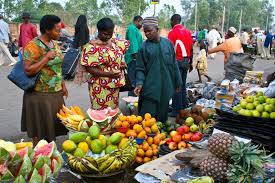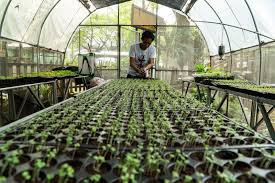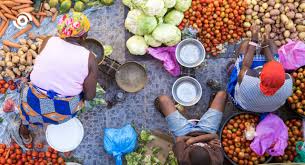Food security is a critical global issue that affects millions of people. It refers to the availability, access, and utilization of food to meet the dietary needs of individuals.
Understanding food security is essential for ensuring that everyone has access to sufficient, safe, and nutritious food.
Defining Food Security
Food security is defined as a condition in which all people, at all times, have physical, social, and economic access to sufficient, safe, and nutritious food that meets their dietary needs for an active and healthy life. The concept encompasses several aspects, including:
1. Availability: The supply of food, whether produced domestically or imported, must be adequate to meet the needs of the population.
2. Access: Individuals must have the financial resources and physical access to obtain food, including overcoming barriers such as poverty, discrimination, and infrastructure deficiencies.
3. Utilization: The quality and safety of food must be sufficient for a healthy diet, which includes considerations of nutrition and food safety.
4. Stability: Food security must be maintained over time, meaning that availability, access, and utilization should not fluctuate drastically due to seasonal or economic changes.
Dimensions of Food Security
Food security comprises several dimensions that together contribute to the overall well-being of individuals and communities:
1. Physical Availability: This dimension focuses on the supply of food through agricultural production, imports, and food reserves. It is crucial to have a consistent supply of food to ensure food security.
2. Economic Access: Economic access refers to the ability of individuals to purchase food. It is influenced by income levels, food prices, and overall economic stability, impacting people’s ability to access nutritious food.
3. Nutritional Quality: The utilization of food is vital for health, requiring a focus on not just quantity but also the nutritional quality of the available food. Access to diverse, healthy foods is essential for a balanced diet.
4. Stability Over Time: Food security must be sustained over time, meaning that people should not only have access to food today but also in the future, regardless of environmental, economic, or political challenges.
Factors Affecting Food Security

Various factors influence food security, including:
1. Climate Change: Changes in climate patterns can impact agricultural productivity, leading to fluctuations in food availability and quality. Extreme weather events can disrupt food production and supply chains.
2. Economic Conditions: Economic stability, including employment rates and income levels, significantly affects individuals’ ability to access food. Economic downturns can increase food insecurity as people struggle to afford basic necessities.
3. Political Stability: Conflict and political instability can disrupt food production and distribution systems, leading to food shortages and increased hunger.
4. Agricultural Practices: Sustainable agricultural practices are vital for maintaining food security. Practices that promote soil health, water conservation, and biodiversity can enhance food production resilience.
5. Population Growth: As the global population continues to grow, the demand for food increases. Meeting this demand requires efficient agricultural practices and resource management.
The Global Importance of Food Security
Food security is a global concern with far-reaching implications:
1. Public Health: Ensuring food security contributes to improved public health outcomes by providing populations with access to nutritious food, reducing malnutrition and related diseases.
2. Economic Development: Food security is closely tied to economic development, as it supports job creation, boosts agricultural productivity, and promotes stable communities.
3. Social Stability: Access to food can influence social cohesion and stability. Food insecurity can lead to unrest and conflict, making it essential for governments to prioritize food security in their policies.
4. Sustainable Development Goals (SDGs): Food security is a critical component of the United Nations Sustainable Development Goals, particularly Goal 2: Zero Hunger, which aims to end hunger, achieve food security, and promote sustainable agriculture.
Read Also: 15 Medicinal Health Benefits Of Artemisia Annua (Sweet Wormwood)
Challenges to Achieving Global Food Security

Several challenges hinder the achievement of global food security:
1. Climate Change: Climate change poses significant threats to agricultural productivity through extreme weather events, changing precipitation patterns, and rising temperatures. These factors can disrupt food production and availability.
2. Political Conflict: Armed conflicts and political instability can disrupt food production and distribution systems, leading to food shortages and increased hunger in affected regions. Refugee crises often exacerbate these issues.
3. Economic Inequality: Disparities in wealth and income can limit access to food for vulnerable populations. Economic downturns can exacerbate food insecurity, making it difficult for low-income households to afford nutritious food.
4. Rapid Population Growth: The growing global population increases the demand for food, putting pressure on agricultural systems to produce more while facing challenges like land degradation and resource depletion.
5. Poor Infrastructure: Inadequate infrastructure, including transportation and storage facilities, can impede food distribution and lead to significant post-harvest losses, particularly in developing countries.
The Role of International Organizations in Food Security
International organizations play a crucial role in addressing food security challenges through various initiatives:
1. United Nations (UN): The UN promotes food security through various agencies, including the Food and Agriculture Organization (FAO) and the World Food Programme (WFP). These organizations provide technical assistance, funding, and emergency food aid to nations facing crises.
2. World Trade Organization (WTO): The WTO facilitates international trade in agricultural products, helping countries improve their food security by enabling access to diverse food sources and stabilizing prices.
3. Non-Governmental Organizations (NGOs): NGOs work at the grassroots level to address food insecurity through community-based programs, providing support for sustainable agriculture, nutrition education, and emergency food relief.
4. Research Institutions: Global research organizations focus on agricultural innovation, developing new technologies and practices to enhance food production, improve resilience to climate change, and promote sustainable practices.
Read Also: 15 Medicinal Health Benefits Of Lysimachia clethroides (Gooseneck Loosestrife)
Strategies to Improve Food Security

To enhance food security globally, several strategies can be implemented:
1. Sustainable Agricultural Practices: Promoting sustainable farming methods, such as agroecology and organic farming, can improve productivity while protecting natural resources. Techniques like crop rotation, intercropping, and soil conservation can enhance yields and resilience.
2. Investment in Infrastructure: Improving transportation, storage, and market access can significantly reduce food losses and enhance the distribution of agricultural products, ensuring that food reaches those who need it most.
3. Strengthening Social Safety Nets: Implementing social protection programs, such as food assistance and cash transfer programs, can help vulnerable populations access food during crises and improve their overall food security.
4. Climate Adaptation Strategies: Developing and promoting climate-resilient crops, along with sustainable water management practices, can help farmers adapt to changing climate conditions and ensure stable food production.
5. Education and Training: Providing education and training for farmers on best agricultural practices, nutrition, and food safety can empower communities to improve their food security and overall well-being.
Food security is a multifaceted issue influenced by various factors, including climate change, economic conditions, and agricultural practices.
Addressing food security is vital for improving public health, promoting economic development, and ensuring social stability on a global scale.
By understanding and addressing the dimensions and factors of food security, we can work towards a future where everyone has access to sufficient and nutritious food.
Do you have any questions, suggestions, or contributions? If so, please feel free to use the comment box below to share your thoughts. We also encourage you to kindly share this information with others who might benefit from it. Since we can’t reach everyone at once, we truly appreciate your help in spreading the word. Thank you so much for your support and for sharing!
Read Also: How to Graft an Avocado Tree to Produce Avocado Fruit
Frequently Asked Questions
We will update this section soon.

